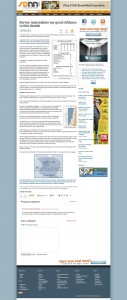This story was reported for San Diego News Network on December 26, 2009.

The attacks of Sept. 11 top the reasons as to why Americans have viewed this decade as one of the worst but respondents see positives through technological advances.
Aging baby boomers, cell phones, gays and genetic testing made up the topics of the decade questions poll conducted by The Pew Research Center for the People and The Press.
The poll, which surveyed 1,504 Americans from Dec. 9-13, found that 50 percent of respondents have a “generally negative rather than a generally positive impression of the past 10 years.” The number is higher than Pew decade polls conducted in the past, where only 19 percent of respondents had negative views of the 1990s and 12 percent in the 1980s (See Chart).
The negative view spreads out evenly age-wise among respondents.
“There is no significant generational divide in impressions of the current decade: roughly half in all age groups view the 2000s negatively, while less than a third rates the decade positively.,” stated the study. “This is in stark contrast to generational differences in views of previous decades. The 1990s are viewed far more positively by younger people -roughly two-thirds of Americans younger than 50 have a positive impression of the decade compared with fewer than half of people ages 50 and older.”
Despite the generally negative view of the 2000s, fewer baby boomers saw this decade negatively.
“Baby Boomers – most of whom are between the ages of 50 and 64 today and were between 20 and 34 in 1979 – view this decade in an overwhelmingly favorable light, with positive impressions outnumbering negative views by 48 points (59% positive vs. 11% negative).”
Highlights of the last 10 years
Fifty-three percent of people said the 9/11 terrorist attacks was “the most important event of the decade,” with Barack Obama’s presidential election at 16 percent and the 2008 financial crisis at 12 percent.
Other “major events” that topped Pew’s study included George W. Bush’s election as president, the Iraq War and Hurricane Katrina.
Focusing on wavelengths and gadgets — the Internet is seen as “a change for the better” by 65 percent of respondents with “young people and well-educated” embracing the World Wide Web scene the most at 76 percent. With the Internet, the use of email and cell phones are also being admired by most with 65 percent and 69 percent favoring the technological forms of communication.
With same-sex marriage gaining attention the past few years, Pew researchers asked survey respondents about society’s “acceptance of gays and lesbians.”
“By greater than two-to-one, those younger than 50 see increased acceptance of gays and lesbians as a change for the better (45%), not worse (19%). By contrast, people ages 65 and older see this as a change for the worse, not the better, by more than two-to-one (46% to 21%),” stated the study.
Genetic testing has also remained a controversial issue in the U.S. but 53 percent of survey respondents have said that it is a change for the better. However, a divide over genetic testing can be seen in correlation with religion and political parties.
“White evangelical Protestants are more divided in their opinion than nearly all other demographic groups,” stated the study. “About four-in-ten (39%) say genetic testing has been a change for the better, but 25% say it has made no difference and 23% say it has been a change for worse. A plurality of Republicans, Democrats and independents say that genetic testing has been a change for the better, but Republicans are more likely than Democrats to say that it has been a change for the worse (18% vs. 8%).”
Despite “advances” in the past 10 years among different spectrums, the word “downhill” was the favorite word to describe this decade.
Hoa Quach is the political editor for the San Diego News Network.
